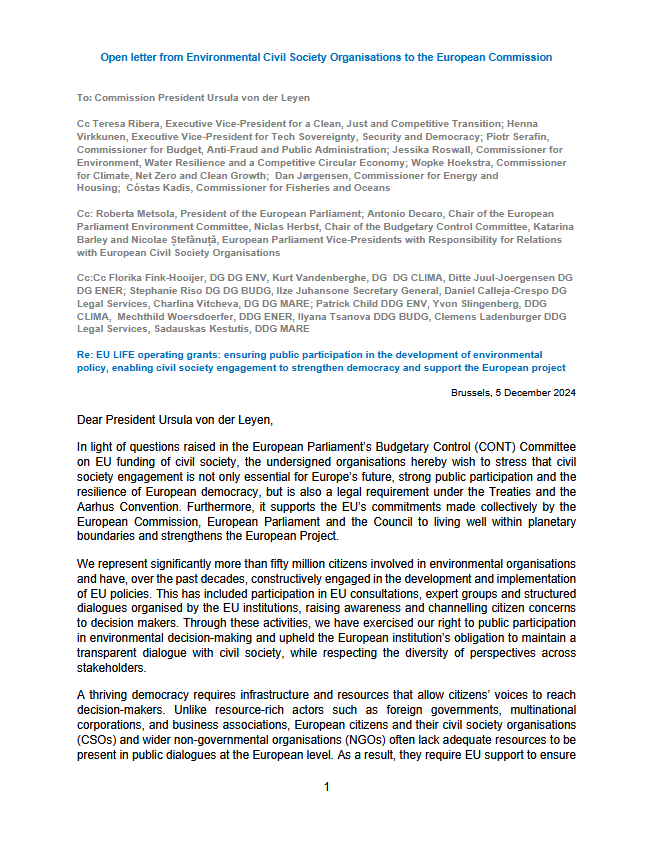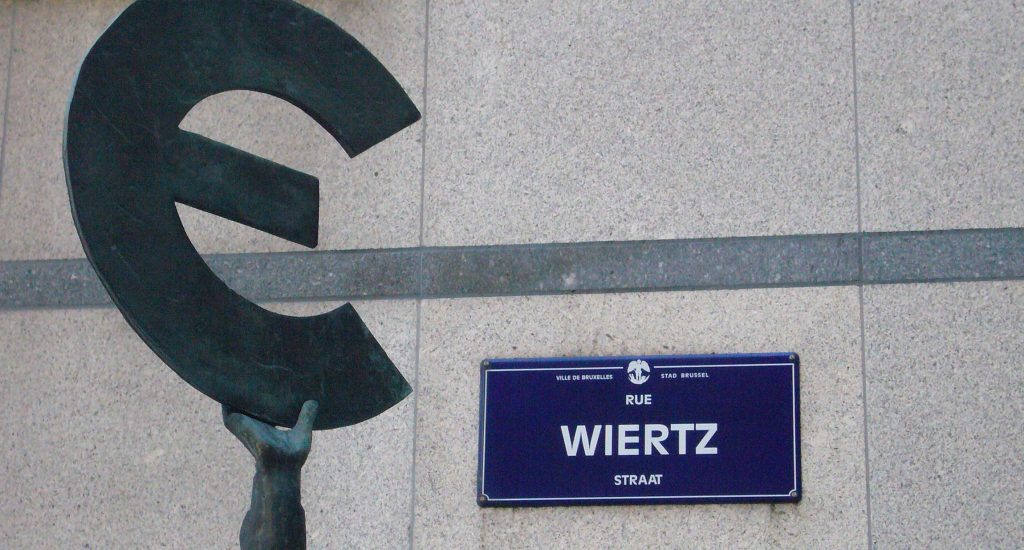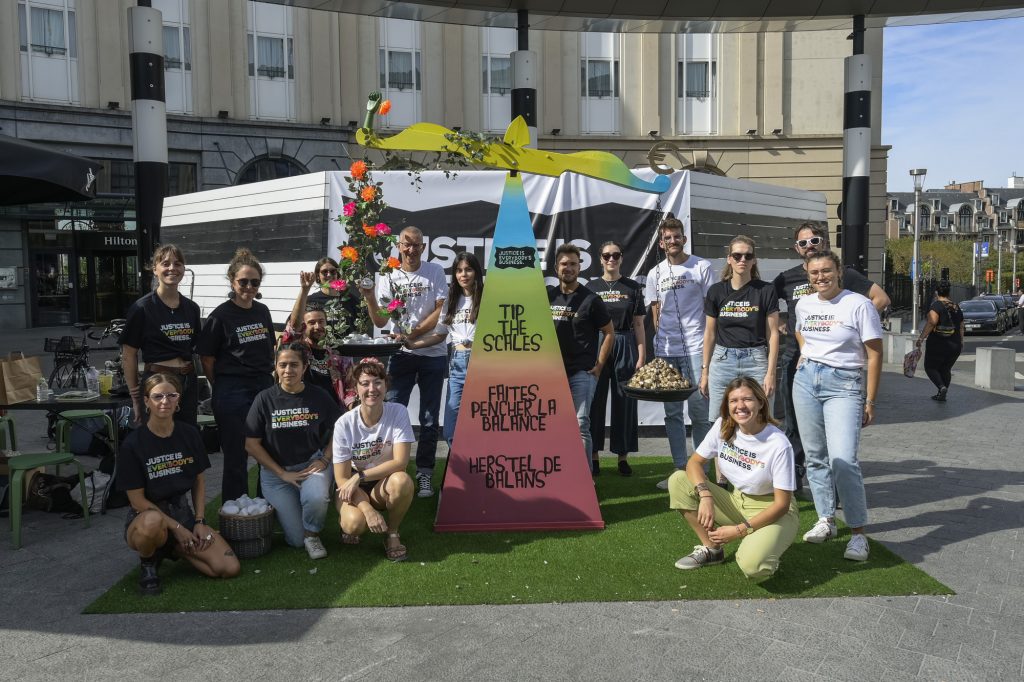
Dear President Ursula von der Leyen,
In light of questions raised in the European Parliament’s Budgetary Control (CONT) Committee on EU funding of civil society, the undersigned organisations hereby wish to stress that civil society engagement is not only essential for Europe’s future, strong public participation and the resilience of European democracy, but is also a legal requirement under the Treaties and the Aarhus Convention. Furthermore, it supports the EU’s commitments made collectively by the European Commission, European Parliament and the Council to living well within planetary boundaries, and strengthens the European Project.
We represent significantly more than fifty million citizens involved in environmental organisations and have, over the past decades, constructively engaged in the development and implementation of EU policies. This has included participation in EU consultations, expert groups and structured dialogues organised by the EU institutions, raising awareness and channelling citizen concerns to decision makers. Through these activities, we have exercised our right to public participation in environmental decision-making and upheld the European institution’s obligation to maintain a transparent dialogue with civil society, while respecting the diversity of perspectives across stakeholders.
A thriving democracy requires infrastructure and resources that allow citizens’ voices to reach decision-makers. Unlike resource-rich actors such as foreign governments, multinational corporations, and business associations, European citizens and their civil society organisations (CSOs) and wider non-governmental organisations (NGOs) often lack adequate resources to be present in public dialogues at the European level. As a result, they require EU support to ensure a more level playing field, and the EU has facilitated this by offering operating grants, and by making EU-funded projects accessible to civil society.
Civil society engagement is at the heart of the European project
The Treaty on the European Union (TEU) recognises the importance of civil society in several ways, particularly in fostering participatory democracy and ensuring dialogue with the EU institutions. This includes providing the “citizens and representative associations the opportunity to express and exchange their views in all areas of Union action” and stipulating that the “institutions are required to maintain an open, transparent, and regular dialogue with civil society”. This establishes the legal foundation for involving civil society organisations in policy-making processes and establishes their role vis-a-vis the European institutions.
Furthermore, public participation in environmental decision-making is a legal right enshrined in the Aarhus Convention, obliging the EU and its Member States to provide opportunities for public participation during the preparation of plans, programmes and policies relating to the environment.
The added value of the EU LIFE programme
According to the LIFE Regulation, the LIFE Programme should (amongst others) “support the development, implementation, monitoring and enforcement of relevant Union legislation and policy on the environment, including nature and biodiversity, and on climate action and the transition to renewable energy or increased energy efficiency, including by improving governance at all levels, in particular by enhancing the capacities of public and private actors and the involvement of civil society”. This is reflected in the LIFE Framework Partnership Agreements that we have concluded with the Commission which have the expressed aim “to strengthen the participation of civil society in the EU policy dialogue, as well as to support implementation and enforcement of Union environmental and climate objectives, including energy transition, by the beneficiaries.”
The EU LIFE programme contributes to the strategic priorities of the EU, and it has a long and successful history of supporting bottom-up projects that have helped CSOs and wider NGOs work with a range of stakeholders (including researchers and academia, businesses, farmers, local communities and others) across Europe to help mitigate climate change, ensure a fossil free energy transition, support farmers engaging in organic and agroecological practices, improve air and water quality, support nature conservation and restoration together with local actors and to engage with businesses in the creation of a sustainable economy, to cite a few. These projects have been successful in creating solidarity across regions, improving the environment and public health, boost local tourism and cooperation with the businesses. In addition, these projects have proven to be a highly efficient use of EU funding.
With a budget of just EUR 5.4 billion for 2021–2027 (less than 0.3% of the total 2 trillion EUR EU budget when combining the MFF and Next Generation EU), LIFE offers a range of critically important societal benefits and builds societal support for the EU’s objectives. The operating grants, which a number of European environmental organisations receive to support their functioning and participation in the development of environmental policies at EU level, in turn, represent only a fraction of this sum.
Transparent and competitive selection, robust accountability
Operating grants are awarded following a competitive, thorough and independent evaluation process, against the objectives and criteria set in the LIFE Regulation, the Financial regulation and the relevant call for proposals.
Recipients adhere to strict accountability standards. Including monitoring, reporting, and audit practices to demonstrate transparent use of public funds. Non-profit civil society organisations are audited every year by external auditors and receive regular monitoring visits and additional external audits to ensure compliance and transparency. Recipients consistently strive to maximise the cost-effectiveness of public funds and to attract additional resources to further enhance the added value of EU funding. Recipients uphold the principle of transparency, and all organisations are part of the Transparency Register and ensure that information on their work, activities, funding sources and other relevant information is publicly available on their websites. Civil society organisation’s engagement in the development and implementation of EU policies, therefore, follows the highest standards of transparency and accountability and contributes to the EU’s reputation as a strong and vibrant democracy in which citizens’ voices are heard and supported.
We welcome your services’ proposals to streamline reporting requirements, which would enhance project management and implementation while maintaining accountability and transparency while ensuring no prejudice is created to the objectives defined by beneficiaries, in accordance with the objectives of the LIFE programme.
The way forward
We, the undersigned organisations, welcome the commitment in your Political Guidelines for 2024-2029 “to step up [the European Union]’s engagement with civil society organisations that have expertise and an important role to play in defending specific societal issues and upholding human rights [and to] ensure civil society is better protected in its work”.
We continue to stand ready to mobilise our networks to advance the EU’s strategic priorities, including the transition to a carbon-neutral, zero-pollution Europe with healthy ecosystems, a Just Transition, respect of human rights and good governance that supports people’s health and wellbeing. This supports the stated commitment by the Commission, European Parliament and Council of “living well within planetary boundaries” as set out in the 8th Environmental Action Programme.
We are committed to strengthening the development and implementation of European policies, on the basis of scientific evidence and with a non-partisan approach, respecting pluralism and diversity, the rule of law, and the democratic decision-making process as set out in the Treaties which mandates the dialogue with diverse perspectives to represent realities across all parts of Europe.
We also strive to counter disinformation and strengthen the information available for the development and implementation of EU policies so that the whole of Europe is represented, help ensure that citizens understand how EU policies serve their needs, which supports the reputation of the European Institutions. Similarly, we are open to discussing how our work supported by the LIFE programme can further maximise added value.
We support transparency and the efficient use of EU funds and clear and transparent criteria applicable to all users of EU public funds.
We are open to working with the European Commission and all EU institutions in advancing the European project for the benefits of all, for present and future generations. We reaffirm our commitment to the above principles for all our work, including, the remaining activities of the current LIFE operating grant and in potential future grants in 2025 and 2026. The LIFE operating grants for environmental NGOs and civil society organisations amount to EUR 15.5 million per year, or 0.006% of the EU budget. This tiny fraction of EU spending helps ensure civil society and environmental NGO voices’ calling for living well within planetary boundaries are heard and balance other voices. We maintain that thanks to the LIFE programme, our engagement has contributed to strengthening the EU’s reputation as a world leader in the needed global transition toward a decarbonised, zero-pollution future.
We would welcome the opportunity to meet with you to explore how civil society can further support you in your commitment to the European Green Deal. We also hope you will encourage Commissioner Serafin, in his 9 December hearing in the European Parliament’s Budget Control Committee, to reiterate your words of support made in your political guidelines on working together with civil society, and recognise how we are important for a healthy democracy in Europe.
We look forward to your response.
Yours sincerely,
Patrick ten Brink, Secretary General, European Environmental Bureau
Ester Asin, Director, WWF EU
Jagoda Munic, Friends of the Earth Europe
Chiara Martinelli, Climate Action Network (CAN) Europe
Genon Jensen, Health and Environment Alliance (HEAL)
Ariel Brunner, BirdLife Europe and Central Asia
Csaba Mezei, general secretary, CEEweb for Biodiversity
David Scallan, Secretary General, European Federation for Hunting and Conservation (FACE)
Mikhail Durkin, Executive Secretary, Coalition Clean Baltic – CCB
William Todts, Executive Director, T&E
Pascale Moehrle, Executive Director, Oceana in Europe
Petr Hlobil, CEE Bankwatch Network
Zeljka Leljak Gracin, Chairwoman, Justice & Environment
Ingvild Jenssen, Director, NGO Shipbreaking Platform
Mark Wilson, Executive Director, Health Care Without Harm Europe
Esra Tat, Executive Director, Zero Waste Europe
Antonella Battaglini, CEO, Renewables-Grid Initiative
Monica Verbeek, Executive Director, Seas At Risk
Sabine Frank, Executive Director, Carbon Market Watch
Harm Schoten, Director, Eurosite – the European Land Conservation Network
Chris Baker, Director, Wetlands International Europe
Jill Warren, CEO, European Cyclists’ Federation
Hannah Mowat, Campaigns Coordinator, Fern
Henriette Christensen, Executive Director, Agroecology Europe
Marta Messa, Secretary General, Slow Food
Eduardo Cuoco, Director, IFOAM Organics Europe
Martin Dermine, Executive Director, Pesticide Action Network (PAN) Europe
Eero Yrjö-Koskinen, Executive Director, Institute for European Environmental Policy (IEEP)
Anaïs Berthier, Head of ClientEarth Brussels
Eric Morbo, Director, Surfrider Foundation Europe
Michael Hosek, President, EUROPARC Federation







